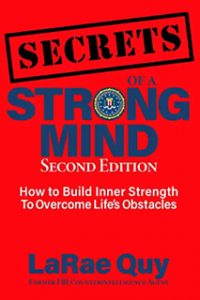There are times when emotional competence trumps emotional intelligence.
A few years ago I called a man whom the FBI suspected of having contact with a hostile intelligence officer from another country. The man’s voice had the warbly sound of an older man and he was clearly rattled by the phone call. My job was twofold: to determine whether he knew the real identity of the foreign spy, and 2) determine whether his contact was legitimate.
He agreed to meet me the next day for coffee. He was very wary at first, but I firmly shook his hand and gently encouraged him to tell me his story.
By taking the time to empathize with his emotions, I gained his trust , respect, and eventually, his cooperation.
Emotional competence is having the savvy to recognize, understand, express, and manage emotions effectively. It has far greater application for executives and entrepreneurs than emotional intelligence, which is the starting point.
A recent article in the Economist reminded anyone who has negotiated a major deal, managed a team, or delivered unpleasant news that emotion is an integral aspect of daily corporate life.
Let’s take a look at 4 simple hacks to sharpen your emotional competence:
1. RECOGNIZE EMOTIONS
The gentleman that I called was scared—he grew up in a country where a visit from the secret police usually meant death or imprisonment.
I recognized where his fear was coming from; I was in a position of power so instead of compounding the negative emotion by threatening him, I allayed his fear by speaking gently and with compassion.
Recognizing an emotion (whether our own or that of others) may sound simple but it is not because our emotional intelligence abilities were not naturally developed as children. We were not born knowing the names of our emotions.
Emotions are not consciously controlled—the part of the brain that deals with emotions is the limbic system which is survival driven. This explains why an emotional response can be straightforward and very powerful.
TIP:
- Recognize that your initial reaction may often be the honest emotion you are feeling.
- Understand it may be a survival-driven response related to a memory where you either felt threatened or safe.
- Notice your emotional responses may not have anything to do with your current situation, but you can overcome them with logic and being aware of your reactions.
2. UNDERSTAND EMOTIONS
Mental toughness is the ability to control your emotions, thoughts, and behavior in ways that will set you up for success.
Are you mentally tough? Take this FREE assessment.
One of the most highly developed skills of an FBI agent is the ability to understand our emotions because they drive our thinking and behavior.
Emotional competence is the ability to predict your response so you are not surprised by your reaction to a wrinkle in a major deal, a team reorganization, or an unplanned event. If you can predict your response, you can plan how to land on your feet when confronted with the unknown.
TIP:
- Understand how and why you reacted to a similar situation in the past.
- Learn what worked, and what did not—be honest with yourself.
- Figure out how you can replicate the positive outcomes and minimize the negative ones.
- Recognize similar situations when they arise so you can prepare for your response.
3. LABEL EMOTIONS
In his book, Your Brain at Work, David Rock explains that honestly labeling your emotion is a great way to control it, whether its good and bad. It’s stupid to pretend a negative emotion doesn’t exist, or attempt to avoid it.
Instead, be mentally tough and learn how to control it.
Labeling is being able to accurately identify an emotion when it arises. This prevents it from taking over because when you name it, you move out of the emotional limbic brain system. It then moves into the thinking, cerebral brain.
TIP:
- Describe an emotion in a word or two, and it will help to reduce the emotion.
- However, if you open up a dialogue about an emotion, it will only increase its intensity.
4. MANAGE YOUR EMOTIONS
There is stress that motivates, promotes well-being, and enables you to perform well. Even though it is positive, you can’t stay in that state forever because you will eventually feel burnout.
Negative emotions produce a uncomfortable feeling because it feels like you’re fighting for survival all the time. Eventually you’ll experience health problems.
Learning to manage your emotions is the magic bullet in emotional competence. If you can name the emotion you are experiencing, you can contain it.
TIP:
Ask yourself these questions:
- When I am stressed or anxious, what is my go-to strategy?
- Is my go-to strategy effective?
- If so, why? If not, why not?
- How can I develop a wider set of strategies when stressed or anxious?
Emotional competence is an incredibly important skill across all aspects of business and life. How do you sharpen up yours?
© 2016 LaRae Quy. All rights reserved.
You can follow me on Twitter, Facebook, Instagram, AND LinkedIn
Are you mentally tough? Here is my FREE Mental Toughness Assessment
Get my new book, “Secrets of a Strong Mind (second edition): How To Build Inner Strength To Overcome Life’s Obstacles”

Author of “Mental Toughness for Women Leaders: 52 Tips To Recognize and Utilize Your Greatest Strengths”



Excellent article LaRae! I never thought about the difference between emotional intelligence and emotional competence but you clearly showed us how important it is to take our emotions to the next step.
Labeling our emotions can really set us up for success in how to handle them. When I am feeling upset with a work situation, I find that being honest about what is the root cause of my frustration helps me more carefully address it. Being honest about our feelings empowers us to being truthful about our responses.
Thanks LaRae for another insightful article!
This is indeed an excellent How-to article.
Often most experts only talk about the What but you have so clearly outlined the steps to get it. Brilliant!
I will surely apply this and I am sure I will gain a lot out of it.
Your point on “Predict your response” reminds me of a person (ex Royal Australian Navy and then, corporate) who I was quite inspired by. He once said to me “you can never be shocked by the same event, twice” Preparedness helps in mental training. It also helps in getting past the sympathetic system and then, accessing more developed regions of the cerebral cortex. There are so many examples in the sports field where successful sportspeople visualise the event in minute detail such that they are prepared for any eventuality. e.g. Michael Phelps and his goggles getting filled with water in a world championship and still beat the world record.
What I particularly loved about this article is how you took self-management of emotions to situations where two people are involved. By sharing your concept of emotional competence, you have made it into a skill which can be practised, measured and developed for successful. Thanks so much for this.
Great post LaRae,
I love the tip to label the emotion with one or two words and how that helps to reduce the emotion. Thank you!
Hi LaRae,
I love your articles, and this one is well done. I agree with Terri Klass on how this article sheds light on taking our emotions to the next step. The emotional competence hacks you provide help expand emotional intelligence into emotional competence.
One of my “give backs” is assist in teaching an mindfulness / emotional intelligence class to high school students. It’s an elective – one semester, 5 days a week. Through guided meditations, journaling, yoga and group discussion, the students learn to define the various emotions, label them, identify where in the body they live and develop ways to shift emotional states. The class is a powerful one, and the changes I have seen in the students during the semester are amazing. And I the growth in my emotional competence is there as well.
Thanks LaRae for these four hacks. I know from first-hand and teaching experiences that they work.
Self-awareness of our emotions and triggers is hard to do without intentional focus but worth the effort. If you haven’t read The Anatomy of Peace, it too covers our red flags so we know when we’re going into an emotional response and can make another choice.
I appreciate how you shared your story here to bring the concept of emotional competence to life. Like most people who read your blog and read your books, I’m fascinated by your professional experience and grateful that you share so generously!
Best,
Alli